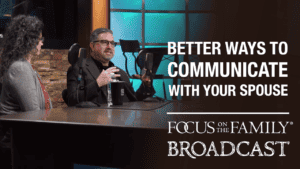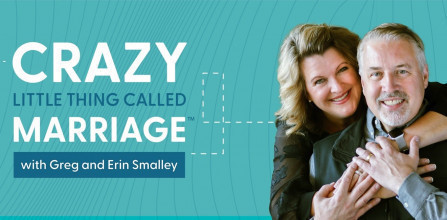
Better Ways to Communicate With Your Spouse
In a discussion based his book With These Words, Pastor Rob Flood and his wife, Gina, offer insights on several key communication skills that have healed and revolutionized their once-troubled marriage.
Today, an expectant mother faces a life-and-death decision. Will you help save her baby’s life? Double your gift to help save babies from abortion through a $1.1 Million Match Opportunity!
Rescue 2x the babies from abortion!
Home » Episodes » Focus on the Family Broadcast » Three Kinds of Love You Need For Your Marriage
John Fuller: This is John Fuller, and today on Focus on the Family with Jim Daly, we’ll be exploring what lifelong happiness is in your marriage. And to get us started, we’ve collected a few quotes about marital happiness, and I wonder if any of these resonate with you. For instance, Ruth Graham, the wife of evangelist Billy Graham, said, “A happy marriage is the union of two forgivers.”
Jim Daly: I definitely like that. Here’s another one, “Marriage is meant to keep people together, not just when things are good, but particularly when they are not. That’s why we make marriage vows, not wishes.”
John: Hmm. (laughs)
Jim: Hmm.
John: That’s good. That’s a good perspective, yeah. Here’s another one, uh, “Marriage is not just spiritual communion, it’s also remembering to take out the trash.”
Jim: (laughs)
John: I think you might have said that one.
Jim: That one… Yeah, that one fits. The, I like that one. Finally, we’ve got, uh, this quote, “A good marriage is where each partner secretly suspects they got the better deal.” And, uh, boy, I know that’s true for me. I don’t know if Jean thinks about (laughs) that.
John: Well, you speak about that often here in the studio.
Jim: Yeah, it’s so much fun. Uh, these statements reflect the kind of marriage we all want to experience, uh, hopefully, and we have a great guest today to talk about how to enjoy your marriage more.
John: Mm-hmm.
Jim: And I think in the push of time, and the rush, and job, and all the requirements with kids, and, man, we can get lost in kinda nurturing our marriage. And that’s a problem, because that could end up ruining that wonderful union that God has created. Hey, the Bible describes marriage in terms of honoring one another, submitting to one another, becoming one flesh.
John: Mm-hmm.
Jim: I don’t think we even understand totally what that means. And I’m convinced God puts husbands and wives together to help us kind of become less selfish, ’cause that’s God’s character, and I think that is one of the very important, uh, points of marriage.
John: Hmm. That’s a good filter to have as you’re looking at your marriage. Now, a couple of things, uh, we have a, a conversation for couples who are mostly in a good place. This is not for couples who are really desperately struggling. Uh, if that’s you, please contact us. We have a lot of resources and help for you. And the second point would be that later on in the show we’ll be getting to some matters about sexual intimacy, and so keep that in mind if you have younger kids listening. And we’re so pleased to have Dr. Dave Gudgel back with us. Uh, he’s an author, a speaker, a pastor of more than 40 years. He has a passion to help couples really experience all that God has for your marriage, and he has a, a great little book that he’s written called Enjoy Your Marriage More: Three Keys to a Great Marriage. Look for copies of that book and other marriage helps at focusonthefamily.com/broadcast or give us a call 800, the letter A and the word FAMILY.
Jim: Dave, welcome back to Focus.
Dr. David Gudgel: Thank you. It’s really fun to come.
Jim: Yeah, it’s so good to have you. Now, I gotta ask the obvious question, uh, what prompted you to write a book called Enjoy Your Marriage More? Is there a behind-the-scenes story there?
Dr. Gudgel: Yeah, it, it got started with a guy who came into my office. He said, “I got about a half hour and I need some help because I’m beginning to get into a relationship that might actually end up in marriage. I’ve been married before. I was married seven years,” he said, “It’s been five years, and I’ve been living the single life, but now, all of a sudden, I’m in this relationship. Anyway, Dave, I got about 30 minutes. Can you help me?” (laughs)
John: Okay. (laughs)
Dr. Gudgel: So that was where we started. (laughs)
Jim: Not, not 45, just 30. (laughs)
Dr. Gudgel: You know? And thus, the small book ultimately came out of that, because of something that I shared with him in that short session.
Jim: Yeah, that’s incredible. I mean, that, that guy sounded like, exact, a time management guy, right? 30 minutes.
John: (laughs)
Dr. Gudgel: Yeah, or he was in a hurry to get a golf game or something. You know, I have no idea, but yeah.
Jim: Okay, I can imagine maybe there were some struggles in that next marriage, right? Yeah?
Dr. Gudgel: Yeah, well… (laughs)
Jim: Pr- probably. Yeah, okay. Hey, uh, you point to King Solomon as, you know, having some great examples for us. I mean, I’m sure that’s true. Um, I’m not even sure, back then, I mean, those kings had a number of wives and all of that, so how do you, how do you discern from King Solomon’s great wisdom, uh, what we should learn as couples about the importance of marriage?
Dr. Gudgel: Yeah, well, he was a man, obviously, that wrote Proverbs, and there’s a lot of wisdom there. He also wrote Ecclesiastes, his book of regrets, but then Song of Solomon. And it seems, from what we can understand about Song of Solomon, it really was descriptive of this love relationship that he had with a Shulamite woman. So his first wife, before he went down the road of craziness, uh, he had a lot of good things to say. And so that’s where we start in this short book, is just looking at Solomon’s desire to experience intimacy in his marriage and enjoy his marriage more.
Jim: Yeah, you know, in, in the, uh, marriage cycle, if I could refer to it as that, I mean, happiness kinda comes and goes. I mentioned, you know, we all want a happy marriage, and it’s true, but that expectation of 100% happiness all the time is probably not realistic.
Dr. Gudgel: Hmm.
Jim: And, and I guess the challenge in marriage is, is really when it’s not as happy as it is at other times and how we manage that.
Dr. Gudgel: Yeah, how to, and we recognize that in this short book also. W- We recognize that, you know, not every day is gonna be a happy day, and there are gonna be difficult times where you’re not even sure you like each other right now.
Jim: Yeah. Does… (laughs) D- Does that ever happen to you, John?
John: Um, not, not in the past few hours. (laughs)
Jim: (laughs) You and Dena? (laughs) Not to put you on the spot.
John: Oh, I, I, I just bother Dena. I mean, I have some pretty irritating (laughs) habits she’s gotta push through and she still loves me anyway.
Jim: (laughs)
John: It’s a wonderful thing.
Jim: You say that so comfortably, I love it.
John: Well, uh, I look in the mirror, I know, I can see what those are, uh, all the time.
Jim: Yeah, I got some bad habits, you know? You gotta stop chewing tobacco. (laughs)
John: (laughs)
Jim: That is not one of your bad habits, right?
John: Hmm. No, it’s not.
Jim: Okay. Hey, uh, Dave, let me ask you, too, in, in Hebrew, uh, in the language of the Hebrews, Solomon uses a word, uh, for love, which is I think…
Dr. Gudgel: Yeah.
Jim: I’m not sure how to pronounce it, but it’s ahab or H-
Dr. Gudgel: Yeah.
Jim: It’s A-H-A-B.
Dr. Gudgel: Yeah.
Jim: So, what’s that… Well, first of all, how do you say that?
Dr. Gudgel: (laughs)
Jim: And secondly-
Dr. Gudgel: Well, ahab is good. And I think-
Jim: Is it ahab?
Dr. Gudgel: Yeah, and I, and it’s just descriptive of a (laughs) multicolored love, if you want it set that way.
Jim: And what does that mean?
Dr. Gudgel: So it’s all-encompassing. It, it encompasses s- s- self-sacrifice. L- Love a sacrifice, we know that is agape love. It encompasses phileo love, the Philadelphia, the City of Brotherly Love, and so there’s emotional connection that we can make, friendship love. I, I, I love to talk about that. And of course, then, it encompasses eros, the, the love of romance. So it’s all encompassed in that one word.
Jim: Well, and we’re gonna talk about all three over the next few minutes, that’s the goal, because that’s the core of the book, right? The… I mean, it’s really good, quick read, which is fun. Uh, the foundation for enduring happiness in marriage is that agape love, uh, which the Bible describes as it’s sacrificial. I think a lot of research right now is showing that sacrifice is kind of one of the truest measures of happiness. People that sacrifice for others, they tend to have a high degree of fulfillment. Isn’t that interesting?
Dr. Gudgel: Oh, I think it’s fascinating, and it’s lovely to see that the psychologists are talking about it that way as well, you know? I, one of the studies we mention in the book is a study that was done by some psychologists who were looking at, “What produces happiness?” And, you know, we think that maybe what produces it is us getting our way, our getting all of the stuff that we’ve always wanted in life. They did a study on this and they found that, uh, the main source of happiness is actually you serving others. It’s you are giving yourself to others.
Jim: Yeah.
Dr. Gudgel: And that produces a happiness that we really need to experience.
Jim: Well, and then, E- E- the thing that is so bizarre for us is how difficult that can become in marriage. I mean, oftentimes, that’s the last person you’re willing to be f- sacrificial toward. And that, that’s backward, right?
Dr. Gudgel: Absolutely, and it’s right where we begin, and it’s difficult for all of us because we are (laughs) self-centered.
Jim: (laughs)
Dr. Gudgel: I hate to say it.
Jim: What?
Dr. Gudgel: Uh, (laughs) yeah, I know, it’s some brand new news here at Focus, but w- we, we have a challenge just even with the dishes on the counter, uh, seeing that somebody needs to wash the dishes, just stopping and washing the dishes. I mean, it’s like below us or whatever it might be, but just small acts of sacrifice could make a huge difference in a marriage.
Jim: Hmm. You identify, uh, Jacob and Rachel in Genesis 29 as a good example. What, what’s going on there that points us in a better direction?
John: Hmm.
Dr. Gudgel: Yeah, it’s a wonderful story, isn’t it, where he’s out looking for a wife and, uh, they come across each other’s path. And ultimately, uh, Jacob ends up serving Laban, Rachel’s father, for seven years, seven years. You know, that was the agreement, and he completed that. And ultimately, his father-in-law tricked him because he ended up with Leah, the older daughter, and that forced him to come to a new agreement of another seven years of serving his father-in-law.
Jim: Mm.
Dr. Gudgel: So 14 years, and it’s really descriptive of self-sacrificing love. I mean, he would’ve not have continued in the relationship had there not been sacrifice.
Jim: Hmm. Well, in that context, why again does marriage become such a difficult environment for us to do the most sacrificial thing we can do?
John: Hmm.
Jim: Uh, y- you know, again, I’m thinking of the traditional husband who works too long, his wife is saying, “Man, you gotta come home. The kids need you.” Y- Y- You’re willing to sacrifice for your vocation to whatever it takes, but then at home, that sacrifice is a little thinner, if I could say it that way? Eh, yeah, and again, it’s a generalization, but it, it, I don’t know why… And we’re three guys sitting here. We don’t have a, a woman’s perspective. But why is that so difficult for us, to know that at home it requires some sacrifice too?
Dr. Gudgel: I think we would rather be served than serve.
Jim: Yeah.
John: Yeah.
Dr. Gudgel: I, I just believe that, you know, there’s something within all of us that struggles with giving ourselves away for the other person’s benefit, whatever that might be.
Jim: And so often, I think, when we read those Scriptures, we’re thinking out there, not in here, inside our home.
John: Hmm.
Dr. Gudgel: Right. Yeah.
Jim: And man, it starts inside the home, right? Your character, who you are. Who’s gonna know who you are any better than your spouse and your kids? That’s who you are.
Dr. Gudgel: And this love that we’re describing is this agape love that really is the work of the Holy Spirit. So, the fruit of the Spirit is love, there it is, the very first of the fruit.
Jim: Yeah.
Dr. Gudgel: And, you know, if it’s going to be something that grows and continues, it’s gotta come through the work that God does in and through us.
John: Hmm.
Jim: Right. All right, the second type of love we need is phileo. You mentioned that, Philadelphia, brotherly love, it sounds great. Uh, what is phileo, that emotional intimacy? Describe it.
Dr. Gudgel: Well, it’s certainly something th- that Jacob had with Rachel. That’s descriptive for us in the Book of Genesis there. You see it in their relationship. And Leah wanted it, because he didn’t love her the same way he loved Rachel. And as we look at that situation, she’s doing everything that she can, and God is even giving her children, for, to gain the favor of, of her husband, you know, but it’s still not clicking for them, so there was missing dimension. And I think oftentimes in our marriage relationships, this emotional intimacy, this emotional connection can be missing, certainly.
Jim: Oh, yeah. I mean, this is really the point, right? Mostly, and again, I’m gonna generalize, but most wives, most women are gonna say, “I need this. This is my core need, is emotional connection with you.” And again, I think we, it’s part of learning to be a servant, to have a sacrificial attitude, we need to understand that about our wives and, and learn, in many cases, how to be more emotionally connected. I, I think Jean and I would, would have that same struggle. Jean would say to me, “I, I don’t feel like we’re emotionally connected the way we need to be.” So I, you know, I gotta work on it, work on it. And, you know, that’s just part of the demand of the relationship in a good way.
Dr. Gudgel: Yes, that gift of understanding that you could give to these, your spouse and, uh, the desire to empathize with whatever’s going on in the circumstance right now, to listen, all of those are connecting pieces in our relationship emotionally.
Jim: Yeah. The verse in First Peter 3:7, you use that as an example of emotional connection.
Dr. Gudgel: Yeah.
Jim: It, particularly in marriage, what, what does that say and why does it apply?
Dr. Gudgel: Yeah, we’re to live with our wives in an understanding way. So I mean, there’s the with factor that we love (laughs) being together. We, we love to celebrate the relationship that God has given us and we’s, uh, take advantage of that, spend time together, listen to each other, share life stories, the whole thing. And then there’s the understanding factor is just to growing in our understanding of each other, but especially, um, man toward his wife. I mean, let’s face it, uh, sometimes we don’t really care about understanding.
John: Mm.
Dr. Gudgel: We just like things to be a certain way, our way, and that could be difficult for us to take the time to understand what’s really going on in the relationship, right?
Jim: It’s true. You and your wife, Bernice, you had a turning point, you said in the book, when something occurred. Describe what happened, and how did it impact you quite like it did?
Dr. Gudgel: Yeah, well, one of the stories I share is where Bernice was involved in our church in a production, a Christmas production, that took months of her time. And she was enjoying it, she loved it, she was gifted for it. And the more and more time it took, especially as it was coming up to the big event, uh, I was required to do more at home. Now, that’s just like all the time for the wife, and it, it began to sort of grate on me, I should say.
Jim: (laughs)
Dr. Gudgel: And I remember, one evening she came home and I just sort of let it go, you know? It wasn’t the best Dave moment, we’ll just say it that way. And what came out of it was Bernice honestly sharing from her heart how much she enjoyed doing what she was doing and how much it hurt her that I didn’t understand how much she enjoyed it and I didn’t see it as that valuable.
Jim: Mm-hmm.
Dr. Gudgel: And boy, did that set us on a road of un- of new understanding in me. And ultimately, it led to me affirming her in the roles that God has given her, and she began serving in new ways, and she just really became all that she could be. But had we not had this kind of a conversation, a beginning to a greater understanding in our relationship, I don’t know that we would’ve got down that road as far as we have so far.
Jim: Hmm. Right.
John: That’s Dave Gudgel. He’s our guest today on Focus on the Family with your host Jim Daly, and, uh, we’re listening in to some of the insights that Dave shared with somebody in his office over a 30-minute appointment or so. Uh, it’s captured in a great little book called Enjoy Your Marriage More: Three Keys to a Great Marriage. And we’d invite you to call 800, the letter A and the word FAMILY and we can tell you more, or stop by our website focusonthefamily.com/broadcast. And, Dave, as you’re sharing that story about Bernice, I’ve got a not-my-best-moment story too, ’cause it was, it was, Dena was going on.
Jim: (laughs)
John: I was in efficiency mode, let’s get, let’s just keep goo- moving on stuff, let’s get stuff done, and she was sharing from her heart about her Bible study friends and some of the burdens.
Jim: Mm.
John: And I thought, “I, I have enough going on. I don’t wanna enter into their burdens too,” and I pretty much said that much. And she looked at me and she said, “These are important people to me.”
Jim: Mm.
John: And I realized, oh man, I, I just totally missed the opportunity to connect with her. Since that, uh, very difficult moment, I’ve learned I gotta lean in. Because when she’s talking about it, it’s important to her. So there can be a lot of different ways that we understand and, and show that kind of appreciation and love to our spouse, right?
Dr. Gudgel: Mm-hmm. Time sh- is one of the ways that we show it, isn’t it?
John: Time, yeah. Yeah, that’s what she was saying.
Dr. Gudgel: And obviously empathy, understanding, all of that.
Jim: In fact, there’s a story that you shared about being at a restaurant, where you saw kind of that connection firsthand.
Dr. Gudgel: Yeah, it was a coffee shop, and I was sitting there writing, actually, working on a different book that we featured in the past here. But, uh, it was fun for me until a few women came and sat in the table next. And, uh, that was no big deal, but then a few more came, and, and it, the number grew to 11. 11 of them, they’re wearing black, you know, uh, colored clothes, which turned out to be jazzercise clothes, and they had evidently just come from, you know, an exercise class or whatever it was. And so, at that point, I couldn’t continue to write. I’m listening to their conversation. You know, and I’m not trying to be obvious about that, but I was. And what I noticed was they didn’t have an agenda. I mean, they didn’t, you know, have a meeting that they had planned-
Jim: (laughs) Was this frustrating to you? (laughs)
Dr. Gudgel: Well, in some ways, because that’s what we do as guys, you know?
John: It would’ve been to me.
Jim: How can you just sit at a table and talk? This is terrible.
Dr. Gudgel: It’s like, you know, you, “Hey, you wanna get together?” “Well, what are you gonna talk about?”
Jim: Yeah. (laughs)
Dr. Gudgel: You know, that’s the immediate question, right? “Oh, well, I don’t know if I wanted to have that conversation and…” And they were just there to be friends and to talk to each other.
Jim: That emotional connection.
Dr. Gudgel: Yes.
Jim: Yeah.
Dr. Gudgel: They made the emotional connection for 45 minutes, then they got up and left. And I thought, “Man, th- that would some, uh, change in people like me.”
Jim: Well, and, and I, you know, there has to be grace in both directions. I mean, there are so many times I come home from playing golf and Jean will say, “So,” you know, just Bob, “how is Bob?” And I go, “Uh, I think he’s fine.”
John: (laughs) Yes.
Jim: “Well, you just spent four and a half hours with him. Don’t you know how Bob is doing?” “Yeah, he hit the ball really straight.”
John: (laughs)
Jim: And finally, Jean twice has said to me, she’ll say, “How was golf?” And I’ll say, “Oh, I shot an 89.” And she’ll go, “No, no, I could care less (laughs) what you shot. How is Bob?” (laughs)
John: (laughs)
Jim: I’m going, “I don’t know. I just know I shot an 89 and he didn’t.” (laughs)
John: (laughs)
Dr. Gudgel: (laughs) Well, and it’s good to see in the Scriptures that the soul of David was knit to the soul of Jonathan, First Samuel 18:1?
Jim: (laughs)
Dr. Gudgel: That gives us hope, doesn’t it? It’s like, hey, two guys could get this kind of a relationship.
Jim: Yeah, it might take us three or four rounds to get to how we’re doing, but, uh, it’s so funny, the difference in our phileo connection, right?
Dr. Gudgel: Yeah.
Jim: It’s all about the swing.
John: Hmm.
Jim: No, it’s not. It’s about how his marriage is doing and how’s he doing with his kids? And, um, hopefully I’ll learn that lesson.
John: Yeah.
Jim: I’ll try harder. All right, the final type of love we need is eros, and that’s that romantic area of passion. And this was the warning you gave earlier, John.
John: Yes, parents, be advised.
Jim: Um, I was intrigued by your observation that couples who experience sex before marriage, uh, kinda cohabiting I believe was the context, can really mess up their relationship when they do get married. Hopefully, that they do get married. Uh, w- why is that?
Dr. Gudgel: Yeah, I’ve just noticed that it seems we get the thing backwards, you know it? When couples are dating, oftentimes they get sexually involved before marriage, so they say yes to sex before marriage. Then after they get married, sometimes this happens in marriage, where couples then say no to sexual intimacy. And so it’s like reversed, it’s backwards. And isn’t that when you want to be able to enjoy, uh, intimacy in your relationship? But other things can get in the way, and one of the things that even happened that Solomon writes about in the Song of Solomon is a rift in their relationship, and it happened at the bedroom door.
Jim: Mm.
John: Mm.
Jim: Hmm. And what, uh, describe it.
Dr. Gudgel: Well, it’s interesting because-
Jim: We’re on the edge of our seats right now.
John: Yeah. (laughs)
Dr. Gudgel: Well, and you mentioned it earlier, there are so many other things that are happening in our lives that can pull us away from our relationship. And evidently, work pulled him away from the Shulamite woman, and he came home very, very late one night. Evidently, she had been waiting for him to get home earlier, but he didn’t. And when he finally came home, she was already in bed, she had already washed her feet. I mean, it’s really descriptive, the passage that’s found there. And he’s basically banging on the door and maybe even trying to pick the lock. I’ll, I don’t know. They had separate bedrooms, obviously, back then. And, uh, eh, he, she’s just not willing to get up and, you know, the inconvenience of it all. She said, “I’m already sleeping. I’m already clean,” you know, all that stuff.
John: Right.
Dr. Gudgel: And, and so he gave up and he left the bedroom door and evidently took a walk somewhere, and she had a change of heart and felt like she needed to come together with him in an intimate way. And it says that on the way to the door, she put a whole bunch of perfume on, she’s dripping with perfume. So it’s, she’s now got romance on mind, her mind as well. And when she got to the door, he was no longer there. You know what she did? She went out and she looked for him. She took the initiative to repair the rift.
Jim: Hmm.
Dr. Gudgel: And I think that’s so important because s- so many times in a relationship, something can come between us and it could last for months and years, and that certainly isn’t God’s plan for a couple.
Jim: Well, and in fact, in the book, again, you wrote the book, you laid the story out there, but you and Bernice had a difficult moment in this area, and you ended up, uh, right before church if I remember correctly, but what happened?
Dr. Gudgel: Yeah. Yeah, what happened was that, uh, the evening before, there were some things that just didn’t happen the way that, you know, I felt like they should. (laughs) I mean, it was just selfishness on my part, let’s just face the reality of this. And, and it was still bothering me the next morning, and I gotta preach a sermon the next morning, you know?
Jim: (laughs) You’re a righteous man.
Dr. Gudgel: So we’re driving to church for me to preach the sermon, probably lead Communion too, you know? And I’m familiar with the passage that says if you got a problem, you know, go fix it and, e- e- even leave the worship service if necessary. So w- with that awareness, when we got to the church parking lot, I said, “I, I just can’t go on like this.” So we drove around the block. And our children were very young, and so in the most discreet way I could possibly have this conversation, uh, we talked about the problem of what happened the night before, and I, uh, owned up to my wrongdoing, and we repaired the rift.
Jim: Hmm.
Dr. Gudgel: And I think, you know, it takes somebody, uh, taking the initiative to begin to go down that road so that hopefully this area of love can be restored and be what the Lord could make it.
John: Yeah.
Jim: Well, and, Dave, you know, this area is such a tenuous one, and there’s probably, it’s like fingerprints, there’s probably no two people that are experiencing exactly the same thing, so you gotta be really careful providing information in that regard and advice. But generally speaking, uh, like I said earlier, we need that, that phileo love, I think predominantly for a woman to feel emotionally connected, and then she’s in a good place.
Dr. Gudgel: Mm-hmm.
Jim: And then men need that… And, and both need it, but I’m saying men need that eros love to keep them supercharged and moving forward. It, it is kinda interesting to say, “Lord, is it a sense of humor that You have,” or, “Why did You set it up quite like this? I mean, couldn’t we not be both eros-driven (laughs) or both phileo-driven?”
John: (laughs) Mm.
Jim: But He did, and I think, again, there’s purpose in it, because He didn’t want us to be selfish, like the evil one, He wants us to be selfless, like Him, and it requires you to do that. And you pretty much struggle with that your entire life, uh, between this phileo and this eros, I believe.
Dr. Gudgel: Yeah, I could say that. We’ve been married 47 years and we, uh, Dave, we’ll just say Dave, is still learning.
Jim: Right.
Dr. Gudgel: And, you know, one of the things we do in the book is we just make a, a triangle and say the three letters of the triangle. And, you know, like you suggested there, there is a sequence here. Agape love is foundational, and that comes through our relationship with God, it’s so important, which builds an emotional connection, which ultimately leads toward the romance that, uh, hopefully God’s gonna give you.
Jim: Well, and to tie a bow around everything we talked about, I mean, that’s the reason when couples live together before marriage, they’re getting that sequence out of order. There’s a reason it’s in that sequence, you know, for agape love, phileo love, and then eros love. I think the Lord intended us, as human beings created in His image, to live life in that sequence so that when we fall in love with our spouse, we get married, then we have the intimacy physically, and that seals the deal, so to speak, for, you know, the context of what God wants for us.
John: Mm-hmm.
Jim: I do appreciate it, Dave. Man, we covered some ground today.
Dr. Gudgel: (laughs)
Jim: And this little book is so powerful and it has so much information in it, Enjoy Your Marriage More: Three Keys to a Great Marriage. And again, if we started the program just looking at people eyeball-to-eyeball and said, “Hey, you want to enjoy your marriage more? This is what you need (laughs) to do,” people would say, “Yes, that’s me, I need that.”
John: Mm-hmm.
Jim: So, man, it is such a great resource. Dave, thank you for being with us. I so appreciate you taking time.
Dr. Gudgel: My pleasure. Thank you.
Jim: Yeah. And if you’re in that spot… This isn’t for the, the marriage that’s in a deep well of difficulty, we’re talking about just your normal tune-up, having a better appreciation for each other, loving on each other. It’s not a counselor moment, it’s just, “Hey, I wanna do better in my marriage.” Uh, get in touch with us. If you can make a donation to Focus for any amount, uh, we’ll send you a copy of Dave’s book as our way of saying thank you for being part of the ministry. If you can do that on a monthly basis, that really helps us. That’s how Jean and I support Focus.
John: Mm-hmm. We do as well.
Jim: I, I know you and Dena do the same, John.
John: Mm-hmm.
Jim: And it just helps us even out the budget for the year. In that, if it’s not possible, we get it, and you can make that one-time gift, that’s great too. Let’s go save more marriages, and save babies, and help parents through difficulties and crisis.
John: Mm.
Jim: That’s what we do here. All the money goes right back into helping other families do well. So, get a great resource, improve your marriage, improve your attitude, become more selfless like the Lord in the process, and it’s a win-win-win.
John: Hmm. Donate as you can. Uh, be generous toward Focus on the Family. Please do ministry through us. And as Jim mentioned, if you’re in a struggling situation, uh, call us to talk to one of our caring Christian counselors. They are so good. They’ll listen to you. They’ll offer some steps forward and even connect you with somebody in your area, uh, if that’s something you’d like. Our number is 800, the letter A and the word FAMILY, 800-232-6459, and you can find all the details at focusonthefamily.com/broadcast. Have a great weekend with your family and your church family as well, and then plan to join us on Monday as we learn how choosing to love your spouse is a much bigger choice than you might have realized.
Dr. Ron Welch: It’s really a matter of saying, “I want to be with you. I want to change my life the way God wants me to change and become the man that you deserve.” And that’s a choice. That’s jumping. That’s not just, like, a, a passive falling into it, it’s more a matter of saying, “I’m making a conscious decision.”

David Gudgel is the Director of Health at Venture Church Network. He has over 40 years of experience as a pastor, serving in a lead role for several churches in Los Angeles, San Francisco, and Phoenix. He has also taught at a variety of events and seminars for Walk Thru the Bible Ministries. David has authored several books including Before You Leave Home, Before You Get Engaged, and Enjoy Your Marriage More. He and his wife, Bernice, have three children and 11 grandchildren. Learn more about David at his website, davidgudgel.com.

Receive the book Enjoy Your Marriage More and an audio download of "Three Kinds of Love You Need For Your Marriage" for your donation of any amount!

On this podcast, Greg and Erin Smalley give you a seat at the table as they dig deep into what a healthy and godly marriage should look like.

Visit our online store and purchase a CD of today's program for yourself or to share with a friend.

Unconditional love is the kind of love we are to seek in marriage.

When your spouse becomes your best friend, the romantic spark is reignited.

Tips for reviving the emotional connection with your spouse.

The Focus on the Family Marriage Assessment is designed to evaluate the strength of 12 essential traits of your marriage. Do you know your marriage's strengths and weaknesses?

Focus on the Family's staff of licensed, professional counselors can help you bring healing and restoration to your family with Christian perspectives you can trust.

In a discussion based his book With These Words, Pastor Rob Flood and his wife, Gina, offer insights on several key communication skills that have healed and revolutionized their once-troubled marriage.

Drs. Les and Leslie Parrott explain how you can improve your marriage by becoming emotionally healthy, and examine three key aspects of good emotional health.

Parenting can be intense, especially raising young children. Moms, especially, have a desperate need for God’s help every single day. Sarah Holmstrom and Stephanie Thurling want to encourage families to make prayer time a regular part of their routine, and they suggest fun games and traditions that can help get your kids more engaged with prayer.

Larnelle Harris shares stories about how God redeemed the dysfunctional past of his parents, the many African-American teachers who sacrificed their time and energy to give young men like himself a better future, and how his faithfulness to godly principles gave him greater opportunities and career success than anything else.

Amy Carroll shares how her perfectionism led to her being discontent in her marriage for over a decade, how she learned to find value in who Christ is, not in what she does, and practical ways everyone can accept the messiness of marriage and of life.

Jonathan McKee offers parents practical advice and encouragement in a discussion based on his book If I Had a Parenting Do Over: 7 Vital Changes I’d Make.